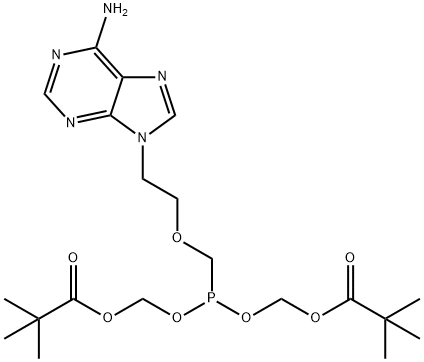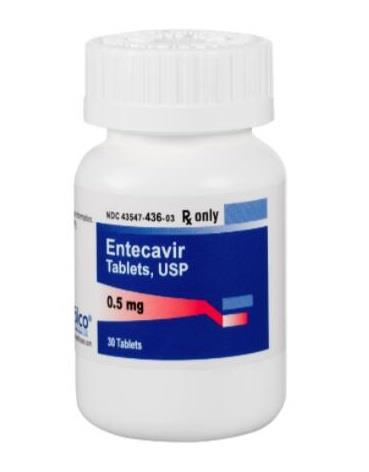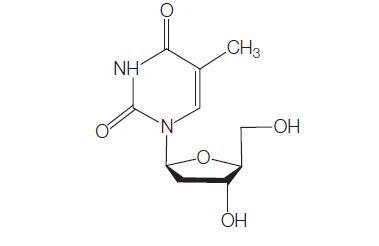Adverse effects of Adefovir dipivoxil
Adefovir dipivoxil is the oral diester prodrug of adefovir, an acyclic nucleotide analog of deoxyadenosine monophosphate Adefovir dipivoxil is rapidly converted to adefovir in the gastrointestinal tract and then further sequentially phosphorylated intracellularly by cellular kinases to its active metabolite, adefovir diphosphate. Adefovir diphosphate is a nucleotide reverse transcriptase inhibitor which inhibits hepatitis B virus (HBV) DNA polymerase by competing with the natural substrate, deoxyadenosine triphosphate, and also causing DNA chain termination after its incorporation into viral DNA.
Adefovir
dipivoxil is a white to off-white crystalline powder with an intrinsic
aqueous solubility in water of 19 mg/ml at pH 2 and 0.4 mg/ml at pH
7.2. It has an octanol/aqueous phosphate buffer (pH 7) partition
coefficient (log p) of 1.91. The chemical structure of adefovir dipivoxil
and adefovir is shown below.
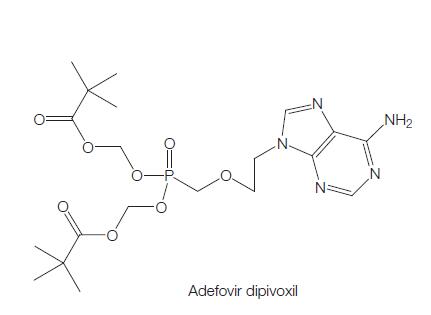
Uses
Adefovir is an effective treatment for chronic HBV infection in adults with evidence of active viral replication and either evidence of persistent elevations in serum aminotransferases [ALT or aspartate transaminase (AST)] or histologically active liver disease, although given currently availability of other HBV antivirals it would not be considered to be first-line treatment. Among available oral agents to treat HBV infection (lamivudine, adefovir, entecavir, telbivudine and tenofovir), adefovir is the least potent, the slowest to suppress HBV DNA levels, the least likely to induce HBeAg seroconversion, and the most likely to result in primary nonresponse to therapy.
Mechanism of action
Adefovir dipivoxil is a diester prodrug of adefovir, an acyclic nucleotide analog of adenosine monophosphate. It is phosphorylated intracellularly to the active metabolite, adefovir diphosphate, by cellular kinases. Adefovir diphosphate inhibits HBV DNA polymerase (reverse transcriptase) by competing with the natural substrate deoxyadenosine triphosphate for incorporation into DNA. Once adefovir is incorporated into the growing DNA chain it causes DNA chain termination. The inhibition constant (Ki) for adefovir diphosphate for HBV DNA polymerase was 0.1 mM. Adefovir has little activity against a range of host DNA polymerases. Adefovir, in addition to acting as a direct antiviral by blocking HBV DNA synthesis, is thought to stimulate natural killer cell activity and to induce endogenous interferon production.
Bioavailability
The oral bioavailability of adefovir is significantly increased when administered as the prodrug adefovir dipivoxil, which is produced by the esterification of adefovir with two pivaloyloxymethyl groups. The oral bioavailability improves from less than 12% to 59% with a 100- fold increased cellular uptake compared with adefovir. Host enzymes in the intestinal epithelium rapidly convert orally administered adefovir dipivoxil to adefovir. As adefovir binds negligibly to plasma or serum proteins (less than 4%) over the concentration range of 0.1 to 25 mg/ml, essentially 100% of the drug in plasma is active.
adverse effects
Nephrotoxicity
Nephrotoxicity remains the main side-effect of concern but is very rare in patients taking<10 mg daily. In a small study of 125 patients treated with adefovir for up to two years, only one patient (<1%) had a confirmed increase in serum creatinine of >0.5 mg/dl.
Hepatotoxicity
Severe acute exacerbation of hepatitis – a “flare” [alanine aminotransferase (ALT) elevations ten times the upper limit of normal or greater] – has been reported after discontinuation of adefovir in patients treated for chronic HBV infection. Most events occurred within 12 weeks of drug discontinuation, usually in the absence of HBeAg seroconversion.
You may like
Lastest Price from Adefovir dipivoxil manufacturers

US $0.00/Kg/Bag2025-04-21
- CAS:
- 142340-99-6
- Min. Order:
- 1KG
- Purity:
- 99.5%min
- Supply Ability:
- 100kg
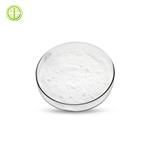
US $0.00-0.00/Kg/Bag2025-04-21
- CAS:
- 142340-99-6
- Min. Order:
- 0.1Kg/Bag
- Purity:
- 99% up, High Density
- Supply Ability:
- 20 tons
